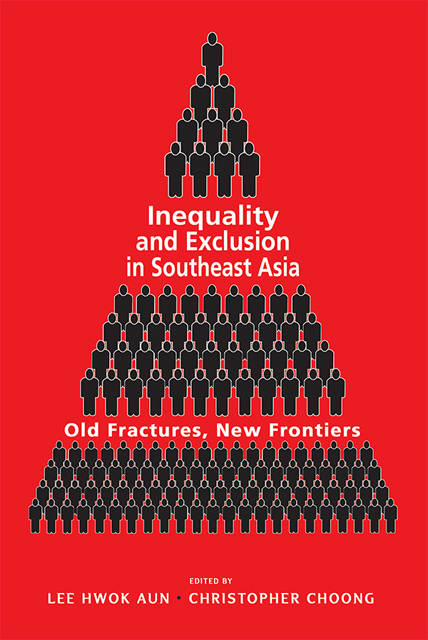Book contents
- Frontmatter
- Contents
- List of Tables
- List of Figures
- Acknowledgements
- About the Contributors
- 1 Introduction: Inequality and Exclusion in Southeast Asia
- 2 Cambodia’s Experiences in Addressing Inequality
- 3 Inequality and Exclusion in Post-Soeharto Indonesia
- 4 Inequality and Exclusion in Malaysia: Macro Trends, Labour Market Dynamics and Gender Dimensions
- 5 Inequality in Myanmar: Structural Change, Policy Outcomes and Gender Dimensions
- 6 Structural Inequality in the Philippines: Oligarchy, Economic Transformation and Current Challenges to Development
- 7 Inequality and the Social Compact in Singapore: Macro Trends vs Lived Inequalities
- 8 Inequality in Thailand: Income, Socio-economic and Wealth Dimensions
- 9 Trends and Drivers of Inequality in Vietnam
- 10 Conclusion: Old Fractures and New Frontiers
- Index
2 - Cambodia’s Experiences in Addressing Inequality
Published online by Cambridge University Press: 01 September 2023
- Frontmatter
- Contents
- List of Tables
- List of Figures
- Acknowledgements
- About the Contributors
- 1 Introduction: Inequality and Exclusion in Southeast Asia
- 2 Cambodia’s Experiences in Addressing Inequality
- 3 Inequality and Exclusion in Post-Soeharto Indonesia
- 4 Inequality and Exclusion in Malaysia: Macro Trends, Labour Market Dynamics and Gender Dimensions
- 5 Inequality in Myanmar: Structural Change, Policy Outcomes and Gender Dimensions
- 6 Structural Inequality in the Philippines: Oligarchy, Economic Transformation and Current Challenges to Development
- 7 Inequality and the Social Compact in Singapore: Macro Trends vs Lived Inequalities
- 8 Inequality in Thailand: Income, Socio-economic and Wealth Dimensions
- 9 Trends and Drivers of Inequality in Vietnam
- 10 Conclusion: Old Fractures and New Frontiers
- Index
Summary
INTRODUCTION
All human beings are born free and equal in dignity and rights. They are endowed with reason and conscience and should act towards one another in a spirit of brotherhood … Everyone has the right to take part in the government of his country, directly or through freely chosen representatives … Everyone has the right to equal access to public service in his country.
United Nations Universal Declaration of Human Rights (1948)The United Nations Universal Declaration of Human Rights stresses that human beings are born free and equal in dignity and rights. Everyone has equal rights to access public services and to take part in the political process and decision-making in their own country. This universal declaration also emphasizes the need for global collective efforts to ensure equal access to social services, free choice of employment, and rights to health and wellbeing and education, among others. Failing to do so can bring about severe consequences to the economy, society and environment, ranging from economic inefficiency and unsustainable growth to poverty and hunger, social injustice and disparity, and environmental depletion. As a result of this universal call, there has been a sharp reduction in global poverty over the last twenty-five years, in which more than a billion people have been lifted out of poverty (World Bank 2018). This global phenomenon is possible due to global economic growth in Asia, including continental giants China and India.
Despite these achievements, the gains from global economic growth have not been shared equally. The world’s richest 1 per cent, numbering 60 million, receive more than 20 per cent of global income, and a select few in the top 0.01 per cent (600,000 individuals, with approximately 1,200 billionaires) have been living extravagant lives (Institute for Policy Studies 2017; Slater 2013). While poverty has declined sharply, inequality has dramatically increased in the same period (Oxfam 2020). Since global resources are finite, resource distribution should be more equal for poverty to be continually reduced, and sustainable growth maintained. Rising inequality erodes the middle class, which is the backbone of society; adversely affects incentives and motivation of workers in sectors that fall behind, thereby lowering labour productivity; hampers investment in human capital because lower income classes do not have access to credit; and, in general, undermines social cohesion (Yap 2013).
- Type
- Chapter
- Information
- Inequality and Exclusion in Southeast AsiaOld Fractures, New Frontiers, pp. 22 - 50Publisher: ISEAS–Yusof Ishak InstituteFirst published in: 2023

